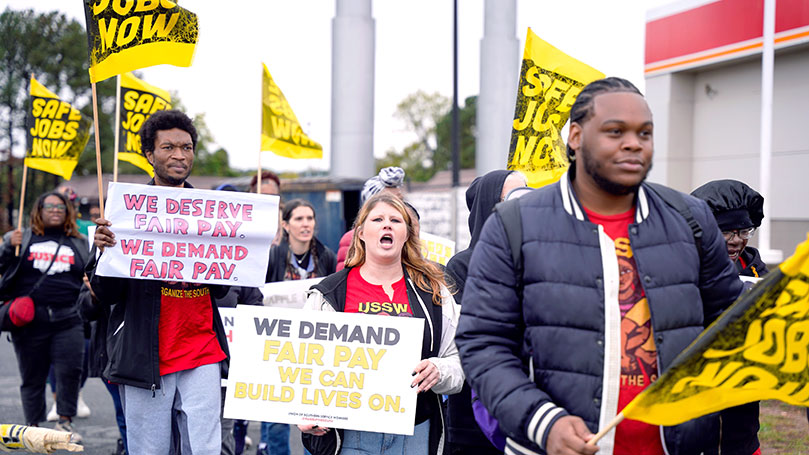
The following is an edited address given by Erica Meade to the CPUSA Labor Commission’s Southeastern Labor Conference in North Carolina earlier this year. Meade is a service worker at Waffle House and organizes service workers as a member of the Atlanta, Georgia chapter of the Union of Southern Service Workers (USSW).
In the South alone there are 15 million workers who make less than $15 an hour. Almost a third of this number is made up of food service workers alone, with our numbers totalling a little more than 4 million. We serve and cook the food that keeps the world moving. Despite the fact that both the working and capitalist class depend on us in order to survive, the only thing that we can depend on as service workers is low wages and unsafe working conditions.
Despite the odds stacked against us, we are not quitters. In fact, we are organizers. We envision a world where we make enough money to support our friends and families. We dream of a day where we can go to work knowing confidently that a stray bullet won’t lose its way out the barrel of a gun and find itself on a tragic path toward us. Overall, we strive for dignity.
The USSW is a little bit different from other unions, but our fight is the same. We grew out of the Fight for $15 movement that sprouted in the 2010s. In the service industry, we face unique conditions that require unique organizing strategies.
Among the most pressing issues we deal with are the prevalence of tip wages and lack of protection from violent customers. Multiple shootings have taken place at Waffle House restaurants across the country. Last year, a worker was shot and killed by an angry customer.
These terrible realities create a high turnover rate, as many who have worked in fast food and restaurants can tell you. In order to work around that, we organize according to our conditions. Rather than prioritizing union elections overseen by the NLRB, we take direct action, showing up right at the doorstep of our employers with bullhorns and crowds behind us. We have low cost union dues because we refuse to be another financial burden that workers must consider. Even though service conditions are atrocious across the country, we focus our struggle here in the South. The stench of slavery still hangs in the air. We don’t ignore it; we challenge it.
Since the USSW’s founding, our biggest campaign has been waged against Waffle House. We know that when folks take a road trip through the region, the one thing on their mind is stopping to load up on waffles, hashbrowns, and bacon.
We have three basic demands on the company:
- First, we demand $25 an hour for all employees.
- Secondly, we demand an end to mandatory meal deductions. As barbaric as it may seem, everyday an employee works at Waffle House, the company takes $3.50 out of their paycheck to supposedly offset food costs. The only catch? The deduction is taken whether an employee eats or not. Let’s call this what it is: wage theft.
- Lastly, we demand 24/7 security at every Waffle House location, because yes, we need it, and yes, Waffle House can afford it. I am a server, not a UFC fighter. I would never bend over backwards for my employer, so I shouldn’t have to do the same to dodge bullets.
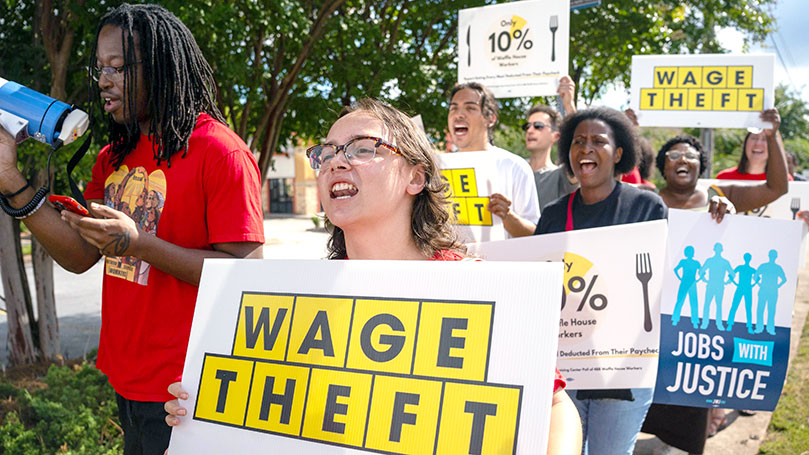
We are making noise and putting the word out that we are organizing service workers. But we also have bigger aspirations that go beyond changing working conditions at Waffle House. We plan to change the South, and with that, change the nation.
Waffle House CEO Joe Rogers III is now telling managers, “When an associate asks why they are not getting 40 hours a week on the schedule, ask them back, ‘What are you doing for the company that warrants 40 hours on the job?’ ” When I overheard a manager tell our grill operator this, I almost dropped the plate I was carrying to make a beeline to corporate and ask Joe some questions back.
This is exactly what Marietta Waffle House workers did on a warm afternoon earlier this year. Not only did they go on strike, but they went to the corporate offices together in unity to hand deliver their demand letter to Joe Rogers!
What the Waffle House CEO said to my manager is truly heartless. The battlelines are more clear than ever. Joe Rogers III is carrying on the Southern white racist tradition of overworking Black people for less than they are worth. We must now carry the same strength and tenacity that those who fought against slavery and Jim Crow before us into today’s fight for economic justice on the job. We are fighting the same beast they did then.
Core values
In the fight against racist CEOs and politicians, the USSW uses four core values that help keep union members united with each other in the fight for equality. We believe in solidarity, militancy, anti-racism, and soul. We know that without strategy, our road to respect on the job will make a detour onto the road of defeat. We are courageous and bold, but we are also smart, and that is reflected in the way we fight.
Solidarity
What is solidarity, and how does it translate to real world organizing?
In the USSW we have a little chant that goes, “Who got yo back? … We got yo back!” Solidarity means when our comrades are returning to work from a strike, we walk back with them to make sure they return to their job safely. When a coworker has been putting in a lot of work on a shift, we are the ones to tell them to sit down and take a five so that we can fill in. Above all, solidarity means that no matter what the struggles on your job are, we will show up and fight for you.
When Popeyes and Burger King workers speak out against heat issues on the job, when Starbucks workers demand an end to unfair dress code policies, and when Waffle House workers demand $25 an hour — Who got their back? We got their back!
Militancy
Our solidarity is shown not just in our demands, but in the intensity required to achieve what is necessary. This is why our second core value is militancy. We are militant because our enemies have shown they will hold onto their wealth no matter the circumstances. We are lucky enough that we do not have to look far for inspiration in our militancy.
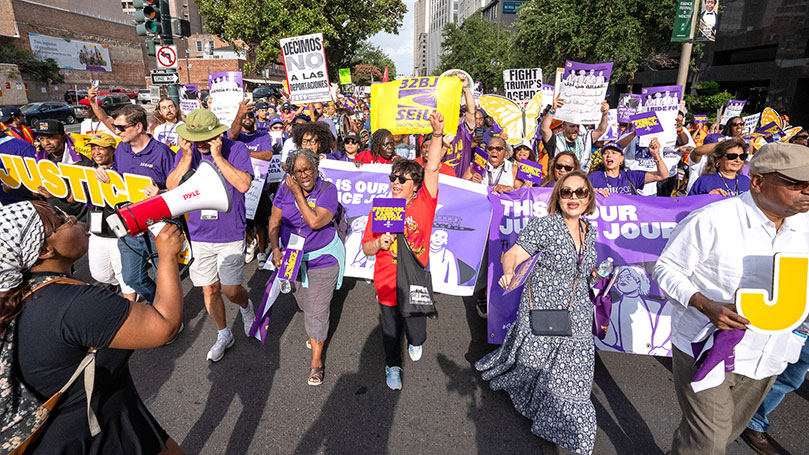
Here in the South we stand on the same ground that organizations such as the Southern Christian Leadership Conference and the Student Nonviolent Coordinating Committee organized during the Civil Rights Movement. They faced fire hoses, dogs, and even bullets. It was only 45 minutes from where we are now that four young African American college students said, “Enough is enough!” and sat down at the Woolworth deli counter in Greensboro. They sang together, canvassed together, and went to jail together. At no moment was retreating an option; the stakes were too high then. Now, with a fascist force in the White House, the stakes may be higher than ever.
In 2020, we sang a song declaring that Black Lives Matter and as long as policing exists under capitalism, so will racism. The capitalists had their own wretched tune. In reaction, they built a military style police training headquarters in Atlanta known as Cop City. In Atlanta, Waffle House is a primary funder of Cop City, and their former CEO Walt Emher sat on the executive board of the Atlanta Police Foundation. It’s not just Waffle House in Southern police agencies’ pockets, it’s also several other companies that have been rocked by the labor movement these past few years, including Amazon, Norfolk Southern, AT&T, and UPS.
As the labor orchestra builds its sound, police are steadily building up their violent nature and potential. How can we smoothly ensure that modern day labor movements are able to take off without having to face the force of these domestic military powers? Corporations’ financial contributions into police militarization are business investments. The money they spend on police donations could very well be made back when police are sent to break strike lines and intimidate workers.
However, just because we are militant does not mean we cannot be peaceful. Just because we are peaceful does not mean we cannot take direct action. Let’s find the solution in the mess that lies in front of us; labor’s survival may depend on it.
Anti-racism
While our unions are militant and united behind a cause for all workers, we keep a razor sharp focus on the fact that many of the terrible laws we face today were created to specifically hold down Black workers. This is why we are steadfast anti-racists, the third core value of the USSW.
Following the Civil War, employers in the service industry quickly shifted to the use of tipped wages. With millions of African Americans in the country suddenly freed and seeking paid work, this move enabled restaurant and rail owners to stay wealthy by hiring formerly enslaved Black people to work for free. Despite the gains of the post–Civil War period, racism persisted and, following the overthrow of Reconstruction, was instituted in the form of Jim Crow.
During the 1930s, while segregation grew, so did the labor movement. However, Black workers in the service and domestic industry did not receive many of the victories secured by this movement, such as minimum wage laws.
The current lack of labor protections for Black service workers is abysmal, but the solution lies in a simply stated, but rarely implemented, organizing strategy: Black and people of color leadership in the labor movement and an emphasis on issues faced by Black workers and other workers of color. The experience of the USSW, rooted in Black membership and leadership, shows that the inclusion of Black people and other people of color within the leadership of our struggles is necessary to the multi-racial working-class unity which has made our victories possible.
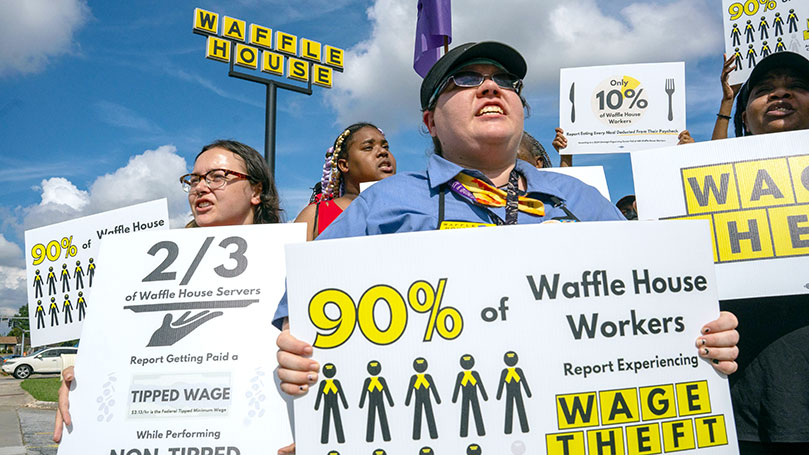
Does that mean white workers in the labor movement are to stand on the sidelines? Of course not. Joe Rogers is going to exploit anyone he can get under the yellow sign. And white workers have a special responsibility to fight against the influence of racism over other white workers. Racism divides workers and weakens our fight against the boss. That is why we fight together. That is why we must love one another and support one another. Racism chains both, and we have nothing to lose but our chains.
Soul
We want to help each other grow, that we know for sure. In order to do this, we need to ask the honest question: do we know how to help each other? How do we create soul, the fourth and final core value of the USSW?
Anyone who has worked a crappy job knows what it’s like to cry on the way home from work. And anyone who’s had this experience knows that what helps lift us up is indulging in what we love most. We eat our favorite meals, listen to our favorite playlist, or call our favorite friend. Unions are not just contracts and bargaining. We are also our biggest dreams. We are the rainbow that shines after the darkest storms.
Once we get off the job, we deal with abusive partners, homophobic comments from family members, or the sexist harassment from a fellow train rider. Our bosses may break us down, but so do these moments. If we are not prepared to work around these issues, we are not prepared to take on the bosses. Let’s sing together. Let’s cry together. Let’s worship together. To love each other is to be a comrade.
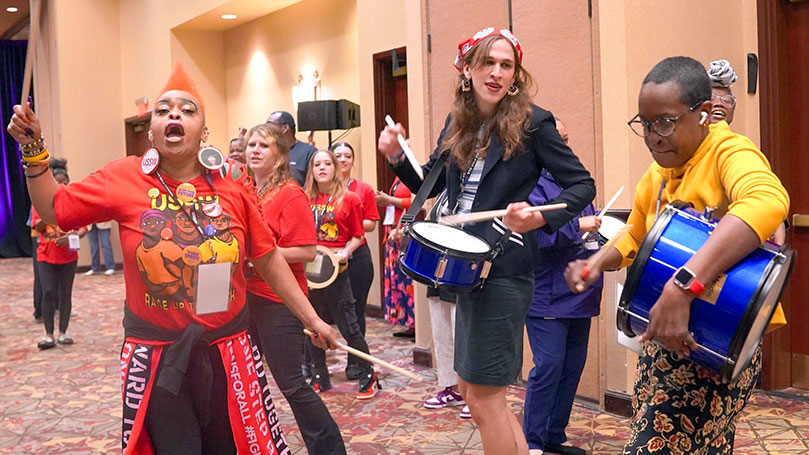
Durham for All
I want to give special recognition to a local Durham movement that the USSW is heavily involved in, Durham for All. The goal of this coalition is to force the local government and its wealthy backers, such as Duke University, to finally show up for the working class the same way the workers have shown up for them for years. Duke University sits on top of billions of dollars, meanwhile rent prices in the Bull City have increased almost 80% over the last 10 years.
The Communist Party stands in solidarity with the long-time workers of the local prestigious university. The Communist Party, just like Durham for All, recognizes that in order to fight and win, a multi-pronged approach is necessary. We need to vote as a community. We need to educate ourselves and our communities on our history. If we don’t know where we came from, we have no idea where we’re headed.
To take on Duke and Waffle House and every other greedy corporation, we need to use all the tools in the toolbox. There may be times when organizing workers to vote for union certification may not be enough to put points on the board in the modern labor organizing movement and other tactics may be needed. For example, last year the USSW forced Waffle House to roll out raises across the board for the first time in its history — without one single NLRB vote!
We are working in an industry that many thought could not be organized 10 years ago. In the words of Angela Davis, instead of accepting what we can’t change, we changed what we couldn’t accept. What’s impossible today is taken for granted tomorrow. Let’s fight like hell, because the promised land is closer than ever.
Images: Workers march to demand a safe working environment, $25 an hour, and end to wafe theft by USSW (X); Waffle House workers protest wage theft by USSW (X); SEIU members march with others against attacks on immigrants by USSW (Facebook); Waffle House workers hold up placards highlighting the exploitation of tipped workers by USSW (X); USSW members celebrate at a #WomenWillLead24 event by USSW (Facebook)


 Join Now
Join Now